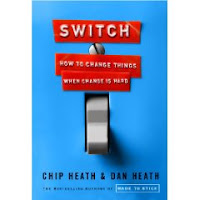Two themes have dominated the business-books scene in recent years: How people think and make decisions, and how people react to change. Not that these are unrelated. Much of what Corporate America’s managers and employees ponder is change—can we possibly implement this new top-down initiative? How will I be affected? What on earth is the boss contemplating?
Recent weeks have seen two more books added to an already impressive roster: Daniel Pink’s Drive: The Surprising Truth About What Motivates Us and surgeon Atul Gawande’s The Checklist Manifesto: How to Get Things Right. Both are riding high on best-seller lists. Now comes a third volume sure to join them there: Switch: How to Change Things When Change is Hard by Chip Heath and Dan Heath, authors of the 2007 best-seller Made to Stick.
It’s instructive to compare just these three. Pink addresses both managers and the rest of us with a research-laden volume aimed at undermining what he sees as institutions’ over reliance on money as a motivator. Gawande argues that a great many professional tasks have become too complicated to be managed by our little brains—and that a simple device, the checklist, can make a world of difference. So both of these accounts consider how our minds work and how particular alterations can make the world a better place.
The Heaths, on the other hand, advocate no particular change, although they offer a great many examples. Instead, like such previous assaults as Who Moved My Cheese? and Our Iceberg Is Melting, Switch assumes that people resist change and must be taught to like it. This book is not as offensive as some of the change-motivating fables—after all, it’s not really aimed at a presumed-to-be-stupid rank and file, but at presumed-to-be-intelligent managers. But unlike, say, The Checklist Manifesto, it’s not exactly a joy to read—nor does one come away feeling exhilarated and eager to take up the authors’ cause.
For my complete review of Switch, posted at AOL's Daily Finance site, go to: http://www.dailyfinance.com/story/books-daily-finance-balancing-reason-and-emotion-in-business/19357960/
Monday, February 22, 2010
Friday, February 12, 2010
Let it Snow!
The heavy snow on the Eastern seaboard has meant lots of downtime for Washington, D.C. workers and even some for New York and New Jersey folks. As we enter the President's Day weekend, I notice I'm getting lots of "Out of the Office" responses to my e-mails. Having had no choice but to take several days off this week already, some people are out today and only returing to work on Tuesday...which makes me think.
When you're unemployed, you never really have a day off--or alternately, every day is a day off. It's a weird feeling: You know that every day, including weekends, you should be doing something regarding a job search. But what? Already this week, I've had an electronic-resume workshop canceled...thanks to forecast "inclement weather." Don't these people know that I need their help? And, now with the rest of the world being out-of-pocket, schussing down the slopes or out to Valentine's Day dinners, there's no way they'll be giving my e-mailed resume the scrutiny it deserves.
Oh, let it snow some more! Away with all work and work-less cares!
When you're unemployed, you never really have a day off--or alternately, every day is a day off. It's a weird feeling: You know that every day, including weekends, you should be doing something regarding a job search. But what? Already this week, I've had an electronic-resume workshop canceled...thanks to forecast "inclement weather." Don't these people know that I need their help? And, now with the rest of the world being out-of-pocket, schussing down the slopes or out to Valentine's Day dinners, there's no way they'll be giving my e-mailed resume the scrutiny it deserves.
Oh, let it snow some more! Away with all work and work-less cares!
Tuesday, February 2, 2010
The Perils of Paulson
When is a has-been NOT a has-been?
When is history NOT simply written by the winners?
Answer: When the subject is economics or the weather. The consequences of both those phenomena live on and on, and the interpreters--whether they be Alan Greenspan or Al Roker--get to talk on and on, into the indefinite future. "Yeah, well I didn't exactly predict what happened...BUT..."
There's still plenty of controversy over the actions taken by the government in the fall of 2008, when the Meltdown was in Flower. (Mixed metaphors are such fun.) Witness the third degrees recently doled out by Congress to both current and former Treasury Secretaries Timothy Geithner and Henry Paulson.
Paulson's hardcover retelling of events is now available in bookstores. For my take on it, go to:
http://www.dailyfinance.com/story/books-dailyfinance-henry-paulsons-meltdown-memoir/19341930/
It's an interesting book, with multiple revelations about the likes of FDIC chair Sheila Bair (who Paulson says was willing to see Citigroup die), numerous Senators and Congresspeople, and about Paulson himself. When the going got tough, as at various Congressional hearings, Paulson reveals that he tended to have the "dry heaves" and had to excuse himself from the room. The Treasury Secretary also shows himself to be a religious man and often depended upon the power of prayer to get him through.
If you're angry at the insiders who managed the bailout, TARP, and the takeover of Freddie Mac and Fannie Mae, you might look at Paulson's volume. It'll make you feel some sympathy for just what these people put themselves through to save the system.
When is history NOT simply written by the winners?
Answer: When the subject is economics or the weather. The consequences of both those phenomena live on and on, and the interpreters--whether they be Alan Greenspan or Al Roker--get to talk on and on, into the indefinite future. "Yeah, well I didn't exactly predict what happened...BUT..."
There's still plenty of controversy over the actions taken by the government in the fall of 2008, when the Meltdown was in Flower. (Mixed metaphors are such fun.) Witness the third degrees recently doled out by Congress to both current and former Treasury Secretaries Timothy Geithner and Henry Paulson.
Paulson's hardcover retelling of events is now available in bookstores. For my take on it, go to:
http://www.dailyfinance.com/story/books-dailyfinance-henry-paulsons-meltdown-memoir/19341930/
It's an interesting book, with multiple revelations about the likes of FDIC chair Sheila Bair (who Paulson says was willing to see Citigroup die), numerous Senators and Congresspeople, and about Paulson himself. When the going got tough, as at various Congressional hearings, Paulson reveals that he tended to have the "dry heaves" and had to excuse himself from the room. The Treasury Secretary also shows himself to be a religious man and often depended upon the power of prayer to get him through.
If you're angry at the insiders who managed the bailout, TARP, and the takeover of Freddie Mac and Fannie Mae, you might look at Paulson's volume. It'll make you feel some sympathy for just what these people put themselves through to save the system.
Subscribe to:
Comments (Atom)






